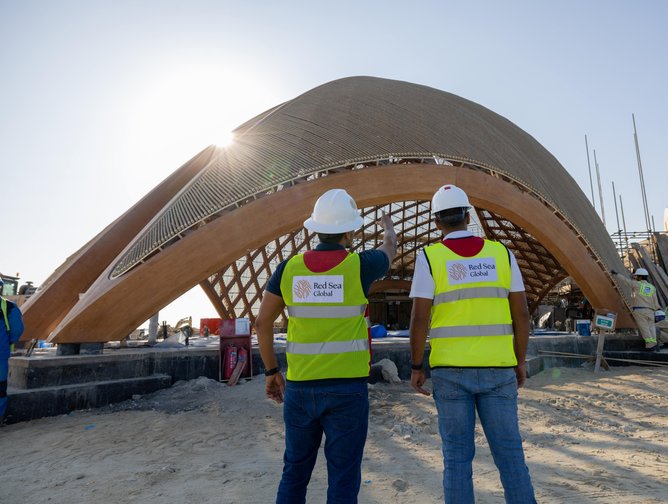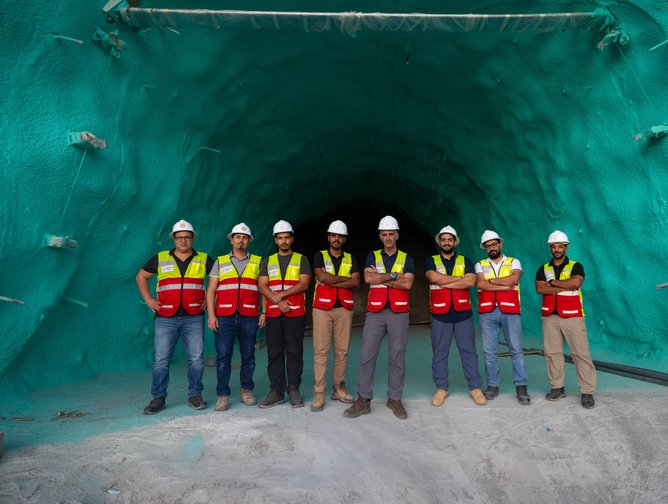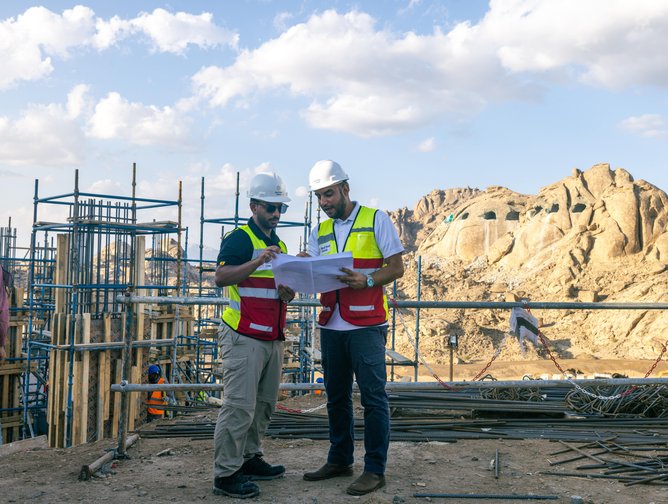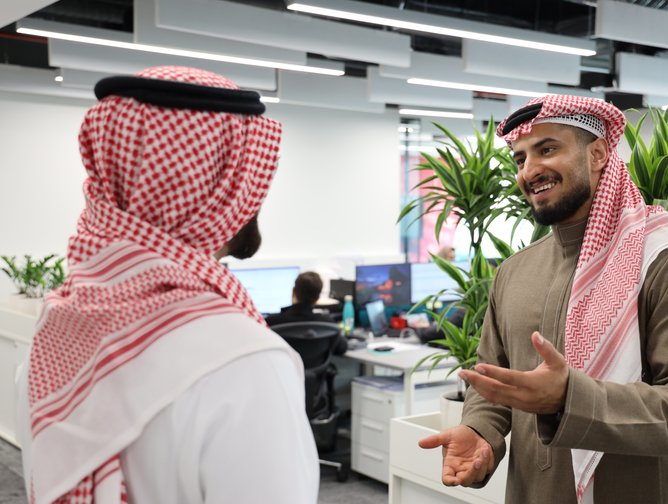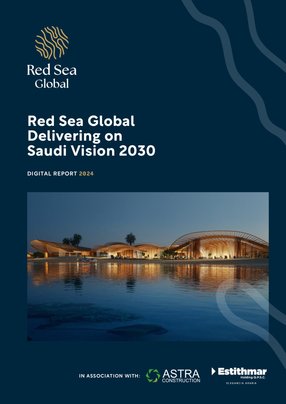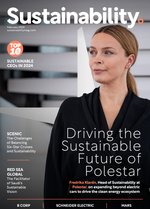For so long Saudi Arabia was the world’s biggest tourism blank canvas: its Red Sea coastline is among the most beautiful anywhere, and yet it remained untouched and unvisited. Pretty much the only foreign visitors drawn to the Saudi Kingdom were pilgrims, heading for Mecca.
To say this situation is changing is a colossal understatement. Take a moment to process this figure: in the first nine months of 2023, Saudi Arabia spent US$26.7bn on tourism destinations and infrastructure. To put this into context, in the league table of national GDPs, $26.7bn would rank 107th out of the world’s 177 countries, between the GDPs of Laos and Nicaragua.
Now, as part of Saudi’s Vision 2030 plan to diversify its economy – economically, socially and culturally – a number of ultra-luxury schemes are under way on the Red Sea shores.
Among the developers involved in delivering the tourism strand of Vision 2030 is Red Sea Global (RSG), which is wholly owned by Saudi Arabia’s Public Investment Fund (PIF).
The PIF is the sovereign wealth fund of Saudi Arabia. It is the largest sovereign wealth fund in the world, with estimated assets of US$776bn.
It was created in 1971 for the purpose of investing funds on behalf of the Government of Saudi Arabia, and is controlled by Crown Prince Mohammed bin Salman Al Saud.
RSG is responsible for developing two giant projects – so-called ‘giga projects’: The Red Sea destination and the Amaala destination.
The Red Sea is a brand-new luxury regenerative tourism destination along the west coast of Saudi Arabia. It opened to guests last year, and by 2030 will be home to 50 hotels, 8,000 rooms, up to 1,000 residential properties and its own international airport.
Amaala is a luxury tourism destination being developed along the Red Sea coast in northwestern Saudi Arabia, about 150 miles back down the coast. It is being developed as one of the world’s premier luxury wellness and sports retreats.
“These two projects are probably the world's most ambitious regenerative tourism destinations,” says Ben Edwards, Group Head of Cost, Commercial & Procurement for RSG.
Edwards adds that the company is “putting people and planet first in what we do”, with a view of “enhancing the well-being not only of our guests but also of the communities and the environments within which we're working”.
How Red Sea Global is organised
In his role, Edwards oversees three departments. The Cost department deals with the estimating and budgeting for all of RSG’s developments. Procurement deals with the procurement of goods and services, while Commercial handles the commercial management of the countless purchase orders and contracts after they've been placed.
Its entire team currently numbers 605 people, but it is growing by the day.
The biggest challenge of his role, says Edwards, is the sheer scale of the projects, and the supply chain capacity in the Saudi market.
“Market capacity within the Kingdom is the biggest single risk we face as an organisation,” Edwards says. “There are so many projects being released to market, and the supply chain is limited within the Kingdom.
This is why Edwards and key members of his team have been travelling the globe to encourage companies to participate in tenders for RSG projects.
The move has been very successful, says Edwards.
“We started in March 2023, with our first procurement roadshow event in Qatar, and have since done events in Egypt, Turkey, the UK, Germany, South Korea and Japan,” he says.
Edwards adds: “The Qatar event has led to 2.5bn Saudi riyals (US$625mn) of contract awards to organisations we met back then.”
The process of getting companies on board with Vision 2030 projects is multi-staged.
“We have the event, we meet the companies, they then go through the pre-qualification and registration processes,” Edwards explains. “That might take four months in some cases, and the companies can then start to receive tenders.”
Overseas events crucial for recruiting new suppliers
Tender periods are usually between two and four months before award, and Edwards reveals that RSG “is already seeing the Qatar event converting into real awards to the supply chain”.
He adds: “It's been a very successful way for us to meet new companies, and to encourage them to explore opportunities in the Kingdom – not just with us but also with other giga projects.
Sometimes, he says, RSG meets suppliers who are not quite the right fit for its own projects but might be ideal for other giga-project developers.
“We have a good network of contacts with our colleagues in the other giga projects, and we share information for mutual benefit,” says Edwards.
Many of the overseas companies RSG draws into its burgeoning supply chain will establish an on-the-ground presence in the Kingdom – a process that poses logistical challenges, but far fewer than was the case in the past, says Edwards.
“It’s much easier than it used to be,” he says. “Back in 2012 it was really quite painful as an overseas registered company to set up in the Kingdom but it's been vastly simplified.”
He adds: “The Ministry of Investment has a dedicated team to help international companies get registrations sorted out. The system is now all online and is much easier.
“The Kingdom is also actively engaged in encouraging companies to form companies and to participate in projects. There are also various incentive programmes led by the PIF. For example, there's one that is designed to encourage investment and development in the Kingdom’s manufacturing capability.”
The overwhelming message, Edwards points out, is that ‘Saudi is open for business’.
Joint ventures helping to boost Saudi supply chains
Not all companies look to set up a Saudi operation. Some choose what Edwards dubs a “softer entry into the market”, by forming a joint venture (JV).
This, he says, is particularly true of construction: “JVs are seen as an easier way to bring in expertise from overseas to collaborate and partner with a local company who has already got boots on the ground.
“They use the expertise as a start-point to develop their own capability, and this is quite a popular approach.
He adds that RSG has helped overseas companies by matching them up with potentially suitable JV partner companies who are based in the Kingdom. “Usually it’s those with a high degree of success,” he says. “We've got some good JV relationships participating in our projects through that programme.”
If creating a value chain capable of delivering such vast projects is one challenge, then actually delivering the project is another.
“They’re big construction projects, so it's all about the workforce and resources,” Edwards points out. “But we also have great focus on making sure the quality and the environmental protection are of the absolute highest standards.”
To this end, RSG has a team of highly qualified and experienced environmental specialists.
“These are the custodians and the guardians of these wonderful natural environments we are working in along the Red Sea coast,” says Edwards. “They make sure everything that we do is of the highest possible standard. It's the same with health and safety.”
Delivering on safety and quality are key to RSG
The challenge, he adds, is getting good contractors who are able to deliver the projects to the right health and safety and the right quality.
“It’s challenging,” he admits, “and we have to leverage all of our capabilities as managers and developers to get the best out of that supply chain.”
Edwards continues: “Some of those companies will need hand-holding and we’ll have to walk them step-by-step through what we want. So, it's a challenge, what with the volume of work that is available and the sheer volume of suppliers in the marketplace.”
Operational challenges aside, RSG is also keenly aware that part of its role is to deliver the social aspects of Vision 2030, and developing opportunities for young Saudi talent is very much part of this, Edwards says.
“By growing leisure tourism we’re creating a new industry in Saudi Arabia, which has in the past only offered religious tourism for people coming for pilgrimage.”
RSG has a number of ways it creates opportunities for talented Saudi men and women. It runs a hospitality scholarship programme, whose intake is young students, who are then trained in hospitality.
“We also have vocational training programmes that train people to be chefs, mobility specialists and horticulturalists,” says Edwards. “These large-scale destinations need a lot of people to run them.
“We also have an elite graduate programme, whereby we take 50 of the top graduates from across the Kingdom’s universities, and run them through a two-year on-the-job rotational training programme, to develop and to nurture the talent that will be leading these projects in the future.”
Make sure you check out the latest edition of Sustainability Magazine and also sign up to our global conference series - Sustainability LIVE 2024
**************
Sustainability Magazine is a BizClik brand
